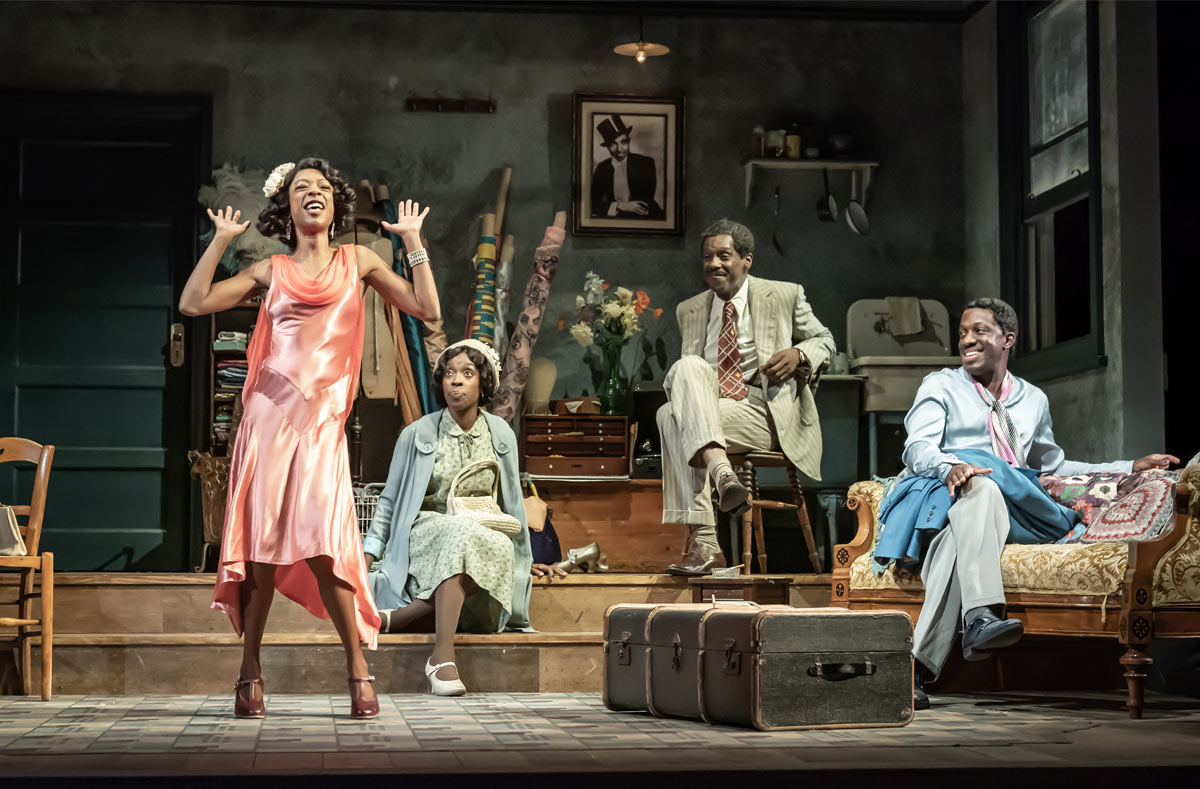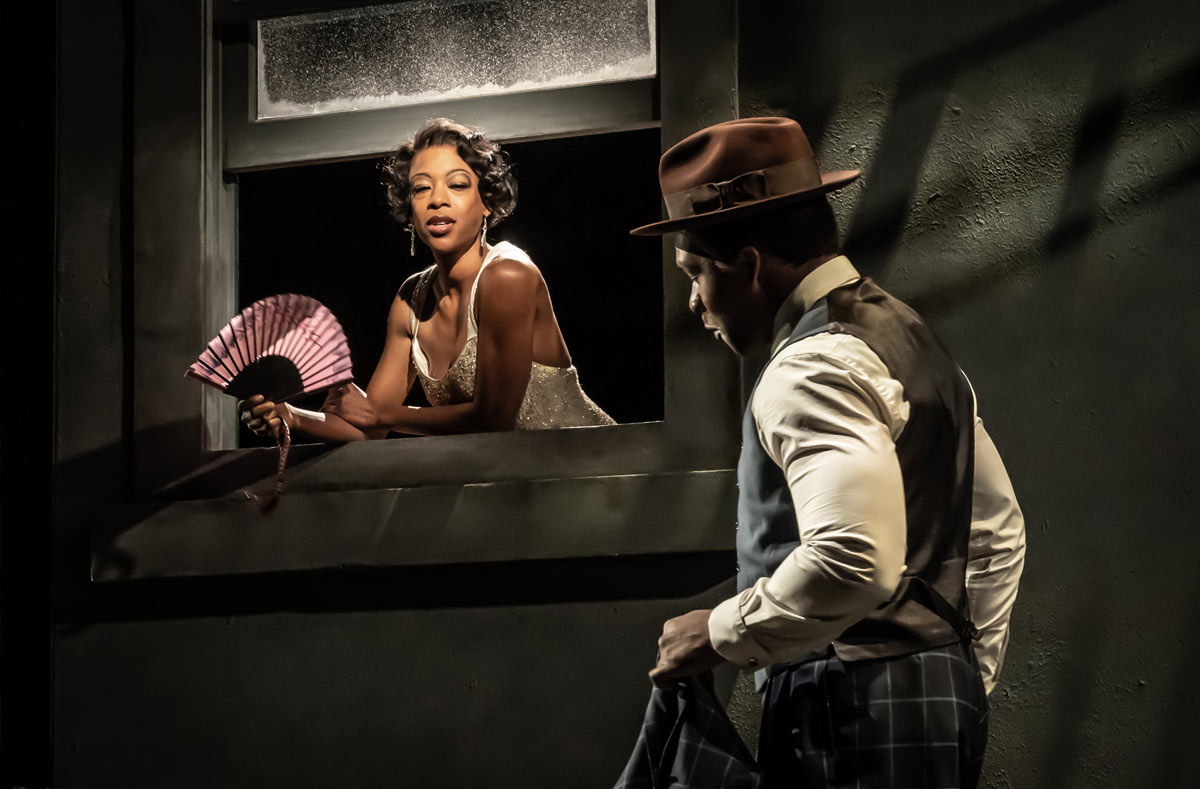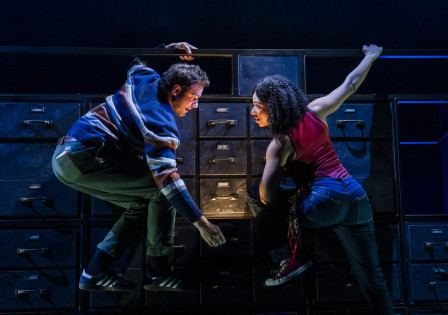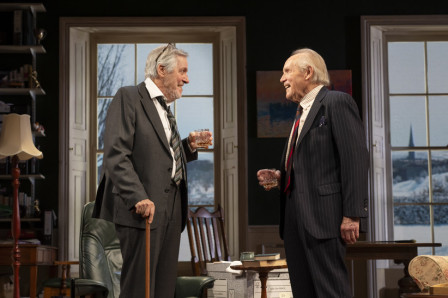Review: BLUES FOR AN ALABAMA SKY at National Lyttelton
The eruption of the cultural and intellectual Black American experience which coalesced to form the Harlem Renaissance of the 1920&30s in New York, spawned a dazzlingly diverse array of talents who still inform popular culture to this day. But as the play begins, much of the vibrancy has begun to decline, heralding the gradual onset of the Great Depression.
 Samira Wiley (Angel), Ronkẹ Adékoluẹjo (Delia), Sule Rimi (Sam) & Giles Terera (Guy) in Blues for an Alabama Sky. Photo by Marc Brenner
Samira Wiley (Angel), Ronkẹ Adékoluẹjo (Delia), Sule Rimi (Sam) & Giles Terera (Guy) in Blues for an Alabama Sky. Photo by Marc Brenner
As music and dance venues close and their performers and creative talents fall on hard times, Pearl Cleage’s play focuses on a closely intertwined group of neighbours whose perpetual tenacity as they hope and strive towards an optimistic future, falls under increasing strain. At the centre is Angel (Samira Wiley) who has been ditched by her male admirer and seeks solace in the companionship of her dependable yet flamboyantly homosexual clothing designer co-habitant Guy (Giles Teresa) who has convinced himself (and everyone around him) that Josephine Baker will any-day-soon, appoint him her personal costume designer and summon him to Paris.
Skirting this pair is a handsome and jocular doctor Sam (Sule Rimi) who takes a shine to an initially prim and circumspect young women’s rights activist Delia (Ronkę Adékoluęjo). When their love eventually blossoms late in the piece, it elicits a naturally joyous response from the audience who it can be said, live and feel every emotion with the characters on stage, such is the naturalism inherent in the writing.
On the rebound, Angel is unexpectedly wooed by a handsome Alabama out-of-towner Leland Cunningham (Osy Ikhile) whose initial care and charm give way to reveal a backward and bigoted nature deeply rooted in the religious doctrines of the southern ministries. His arrival marks a turning point in all their fortunes and a tragic event causes everybody to re-evaluate their expectations of life and the future.
BLUES FOR AN ALABAMA SKY has as much to say today about the black experience, disparity in opportunity and women’s rights (particularly access to healthcare) as the period in which the play is set. Lynette Linton proves a dynamic and steady hand on the tiller, directing her individual players coherently, resulting in a strongly bonded troupe and a startlingly meaningful and subtle revival.
One especially nuanced touch, was the inclusion of 4 bluesy laments, briefly sung to the words of Langston Hughes’ Dream poems. They add a plaintiff layer to Frankie Bradshaw’s atmospheric set and costumes as the stage revolve periodically turns.
 Samira Wiley (Angel) and Osy Ikhile (Leland) in Blues for an Alabama Sky. Photo by Marc Brenner
Samira Wiley (Angel) and Osy Ikhile (Leland) in Blues for an Alabama Sky. Photo by Marc Brenner
Latest News

 Cast announced for the World Premiere of ALLEGRA
4 February 2026 at 15:02
Cast announced for the World Premiere of ALLEGRA
4 February 2026 at 15:02

 Cast announced for European premiere of THE JONATHAN LARSON PROJECT
4 February 2026 at 14:14
Cast announced for European premiere of THE JONATHAN LARSON PROJECT
4 February 2026 at 14:14

 Review: LOST ATOMS at Lyric Hammersmith
4 February 2026 at 12:08
Review: LOST ATOMS at Lyric Hammersmith
4 February 2026 at 12:08

 I'M SORRY, PRIME MINISTER at Apollo Theatre - Production images released
4 February 2026 at 10:41
I'M SORRY, PRIME MINISTER at Apollo Theatre - Production images released
4 February 2026 at 10:41